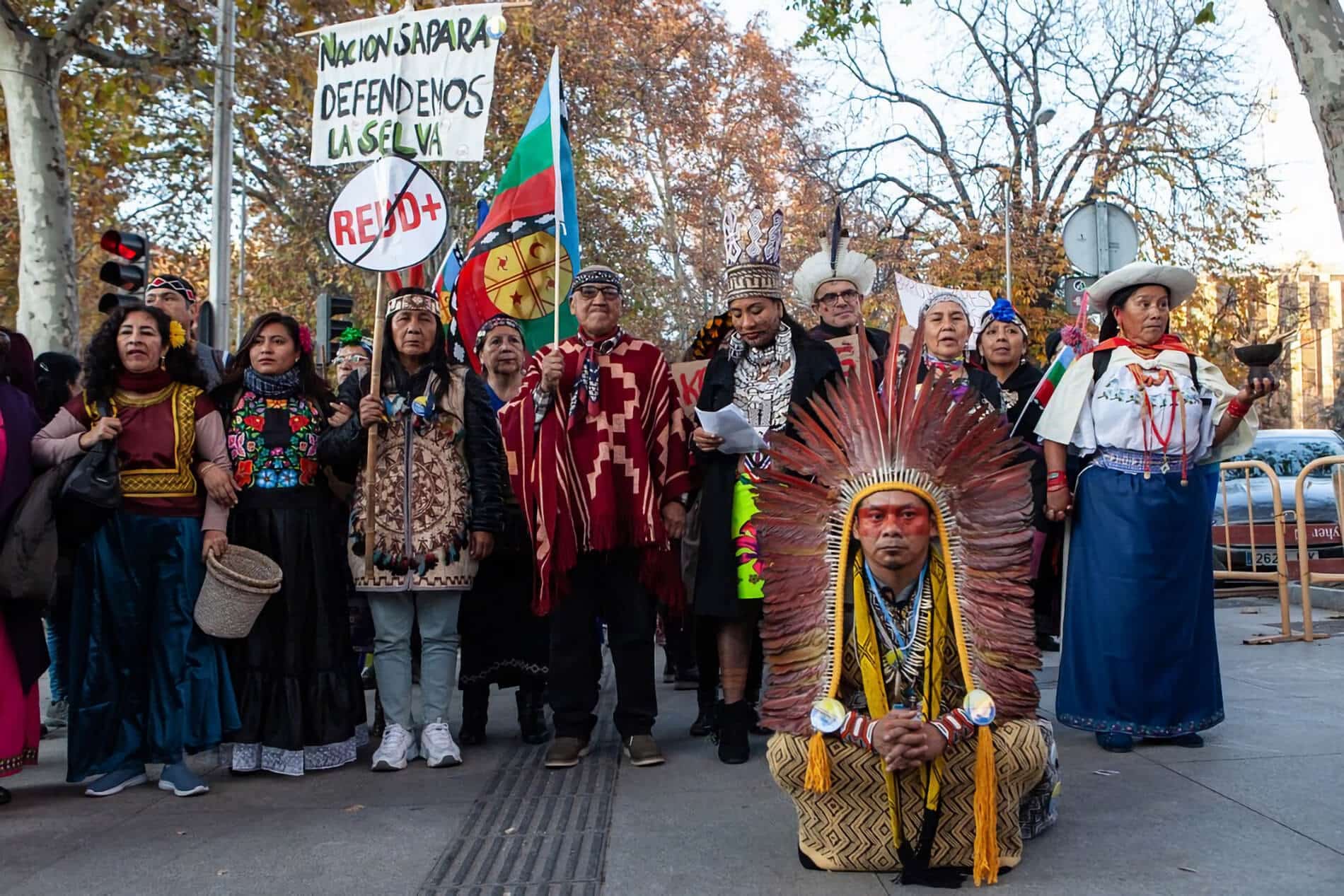
MADRID – Indigenous delegations from around the globe raised environmental justice demands and awareness during negotiations here of the U.N. Framework Convention on Climate Change Dec. 2-13.
Participants haled from the tar-sands oilfields of Canada’s aboriginal boreal forests, to the slated route of the Keystone XL hazardous crude pipeline in the unceded 1868 Ft. Laramie Treaty territory of the U.S. Great Plains, to the streets of Latin America, to the venues of the framework’s 25th Conference of the Parties (COP) in Spain.
Adding unprecedented depth of perspective to the debates surrounding the negotiations, an indigenous contingent led the 500,000-strong COP25 Climate March in Madrid on Dec. 8, with the slogan “Colonialism caused this Climate Crisis and Indigenous Rights are the Climate Solution.”
Framework negotiators from 197 countries signatory to the convention are tasked with reaching agreements in response to the August report from the Intergovernmental Panel on Climate Change (IPCC), which points out that the reduction of greenhouse gases in all sectors is the only way to keep global warming below 1.5°C.
International tools already invented and in-play for that, — such as the Paris Accords, its Carbon Markets language, the Warsaw Loss and Damage Mechanism, and the Green Fund for Climate –, lack accountability and enforcement measures; they are not profound or agile enough to prevent the planetary devastation envisaged from present coal and petroleum product use rates, indigenous leaders concur.
Tla’Amin First Nation citizen Ta’kaiya Blaney, taking part in the Dec. 8 march as part of Indigenous Climate Action’s Youth Delegation, said, “My ancestors were the original climate activists, beginning at first contact. We’ve sacrificed everything for our lands. We’ve fought, we’ve died. We as indigenous youth are calling on global leaders to do better.”
As long as governments continue to administer rules that put native populations at the greatest disadvantage in facing the climate emergency, civil disobedience is the tonic, she advocated during the Social Summit for Climate the same day.
“If the law is upholding a system that perpetuates violence against land, future generations and disproportionately, black, brown and indigenous people, you have the right to stand against those wrongs,” she said.
She urged allies of indigenous struggles to take one step more and become “accomplices unafraid to use direct action as a tactic in strategic organizing,” according to reporting by the Indigenous Rising media team, on the scene in Madrid.
Indigenous Rising is an outgrowth of the Indigenous Environmental Network, as is Indigenous Climate Action, which sponsored a panel at the social summit moderated by its executive director, Eriel Deranger, entitled “Indigenous Perspectives on ‘Keep It In The Ground’: The Fight to Stop the Alberta Tar Sands and Associated Pipelines.”
The Alberta tar sands, where she is from, would be the source of the toxic diluted bitumen, or dilbit, that would flow through TC Energy Corp.’s Keystone XL Pipeline, if permits are granted amidst lawsuits by tribal governments and other U.S. heartlands intervenors opposing the private infrastructure project through Montana, South Dakota, and Nebraska.
One such intervenor, the grassroots non-profit Dakota Rural Action, put out a call for members of the public to attend water permit hearings, scheduled to start Dec. 17 at the South Dakota state capital of Pierre.
“This may be the final round of hearings, and it’s imperative that the public turn out to ask the Water Management Board to DENY these permits on the basis of the public interest,” said the organization’s “action update.”
Other intervenors are Mniwakan Nakicijinpi (Lone Eagle family youth pipeline fighters), the Yankton (Ihanktonwan), Rosebud, and Cheyenne River Sioux tribal governments, the Great Plains Tribal Water Alliance, and individuals from Montana, South Dakota and Nebraska.
Public comment was expected to open at 8:30 a.m. Central time on the first day of hearings in Room 414 of the State Capitol Building.
Negative impact on climate stability was the reason the previous U.S. Presidential Administration nixed a permit request to build the pipeline from Canada into the United States, but the current White House ordered a reversal, leading to tribal government lawsuits.
In Chile, an alternative Peoples’ Summit for climate from Dec. 2-7 denounced manifold rights violations of President Sebastian Piñera, who decided to move the official framework talks from his country to Spain to avoid international exposure of widespread domestic unrest.
The Latin American alternative summit issued a declaration, stating, “We reject incentives for false climate-change solutions that deepen the crisis and strengthen the model that generates it.”
The declaration calls for granting “indigenous and African descendants’ demands, especially for demilitarization of territories.”
Contact Talli Nauman at talli.nauman(at)gmail.com

Indigenous Peoples are putting their bodies on the line and it's our responsibility to make sure you know why. That takes time, expertise and resources - and we're up against a constant tide of misinformation and distorted coverage. By supporting IC you're empowering the kind of journalism we need, at the moment we need it most.